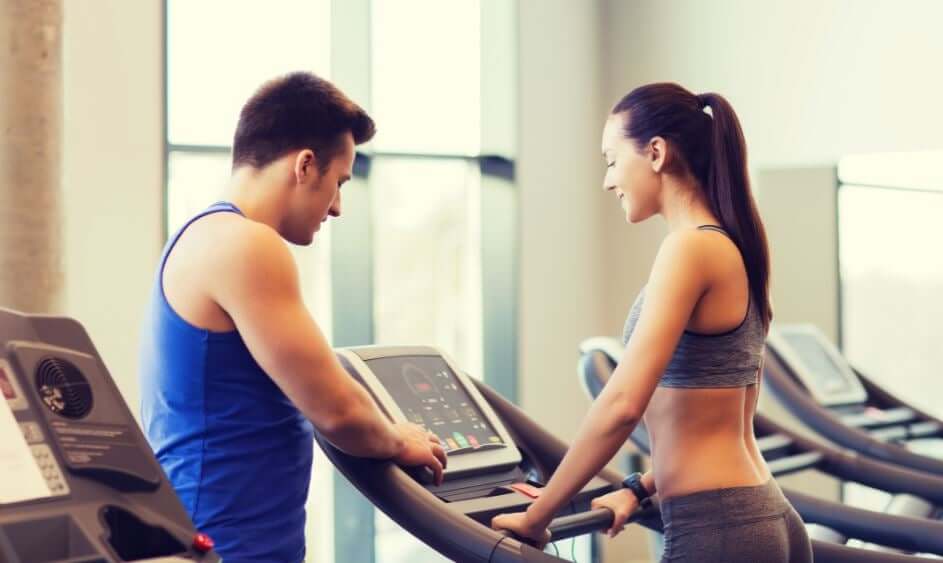Cardio on an Empty Stomach: Is It Good for You?

Many people wonder if doing fasted cardio can improve results and increase fat loss. In fact, there are some athletes who claim that performing cardio on an empty stomach is a good option.
Certainly, you should know that glycogen, a stored carbohydrate, often decreases in the morning after going without food overnight.
This causes the body to be able to burn a higher percentage of fat by working on an empty stomach. That’s because its carbohydrate storage isn’t available. Although in most cases, you don’t completely deplete your glycogen stores while you sleep, which allows you to burn fat safely.

In addition, as the glycogen stored in the muscles and liver decreases, the level of glucose in the blood begins to decrease. This can lead to fatigue, lack of coordination, dizziness, and difficulty concentrating.
Conversely, overeating before training can be negative too, as this causes some of the blood to reroute from the working muscles to the digestive system to help process the food. Considering that blood is your body’s oxygen supply system, overeating before training may mean less oxygen is available to your body. This can reduce the ability to burn fat by exercising.
Is it good to do cardio on an empty stomach?
Without a doubt, many athletes wonder if cardio workouts on an empty stomach can accelerate fat loss. Some believe that fasted cardio is more effective at burning fat, while others believe it can decrease performance and limit fat loss.
Before knowing the answer, it’s important to interpret the importance of food in cardio sessions. For example, carbohydrates are the preferred source of fuel to provide the energy the body needs. At the same time, protein is useful for muscle growth and repair.

So, we recommend experimenting to see what works best for your body. If you find that you get good results working on an empty stomach, keep at it. Make sure you eat protein and carbohydrates soon after you’re done, though.
Do what works best for your workouts
Doing cardio on an empty stomach causes your glycogen supply to be low, as nothing is going into your stomach from the night before. Without enough glycogen, the body starts burning fat sooner. In fact, some studies show that fasted cardio causes athletes to burn 20 percent more body fat compared to those who ate breakfast before training.
The truth is, however, that this only occurs at very low levels of training intensity. During moderate to high-intensity levels, the body continues to break down significantly more fat on an empty stomach compared to after eating.
However, other research has shown that women lose about the same amount of body weight with one hour of moderate-intensity cardio, regardless of whether they fast or not.
Finally, we recommend that if you want to eat food before cardio, it’s best to choose light foods. For example, apples, bananas, or nuts. Opt for foods that are easy to digest and ideal for getting the energy you need for your workout. Although, you should never feel pressured to do fasted cardio simply because you want to speed up your results.
However, if you feel totally exhausted after a few minutes of cardio, it may not be the right approach. Don’t forget that, in general, if your workouts are long, intense, and include high-intensity intervals or weights, it’s a good idea to fuel up before your sessions.
Many people wonder if doing fasted cardio can improve results and increase fat loss. In fact, there are some athletes who claim that performing cardio on an empty stomach is a good option.
Certainly, you should know that glycogen, a stored carbohydrate, often decreases in the morning after going without food overnight.
This causes the body to be able to burn a higher percentage of fat by working on an empty stomach. That’s because its carbohydrate storage isn’t available. Although in most cases, you don’t completely deplete your glycogen stores while you sleep, which allows you to burn fat safely.

In addition, as the glycogen stored in the muscles and liver decreases, the level of glucose in the blood begins to decrease. This can lead to fatigue, lack of coordination, dizziness, and difficulty concentrating.
Conversely, overeating before training can be negative too, as this causes some of the blood to reroute from the working muscles to the digestive system to help process the food. Considering that blood is your body’s oxygen supply system, overeating before training may mean less oxygen is available to your body. This can reduce the ability to burn fat by exercising.
Is it good to do cardio on an empty stomach?
Without a doubt, many athletes wonder if cardio workouts on an empty stomach can accelerate fat loss. Some believe that fasted cardio is more effective at burning fat, while others believe it can decrease performance and limit fat loss.
Before knowing the answer, it’s important to interpret the importance of food in cardio sessions. For example, carbohydrates are the preferred source of fuel to provide the energy the body needs. At the same time, protein is useful for muscle growth and repair.

So, we recommend experimenting to see what works best for your body. If you find that you get good results working on an empty stomach, keep at it. Make sure you eat protein and carbohydrates soon after you’re done, though.
Do what works best for your workouts
Doing cardio on an empty stomach causes your glycogen supply to be low, as nothing is going into your stomach from the night before. Without enough glycogen, the body starts burning fat sooner. In fact, some studies show that fasted cardio causes athletes to burn 20 percent more body fat compared to those who ate breakfast before training.
The truth is, however, that this only occurs at very low levels of training intensity. During moderate to high-intensity levels, the body continues to break down significantly more fat on an empty stomach compared to after eating.
However, other research has shown that women lose about the same amount of body weight with one hour of moderate-intensity cardio, regardless of whether they fast or not.
Finally, we recommend that if you want to eat food before cardio, it’s best to choose light foods. For example, apples, bananas, or nuts. Opt for foods that are easy to digest and ideal for getting the energy you need for your workout. Although, you should never feel pressured to do fasted cardio simply because you want to speed up your results.
However, if you feel totally exhausted after a few minutes of cardio, it may not be the right approach. Don’t forget that, in general, if your workouts are long, intense, and include high-intensity intervals or weights, it’s a good idea to fuel up before your sessions.
This text is provided for informational purposes only and does not replace consultation with a professional. If in doubt, consult your specialist.








